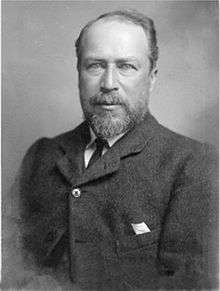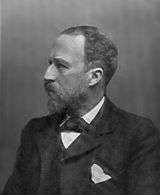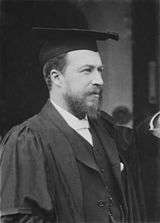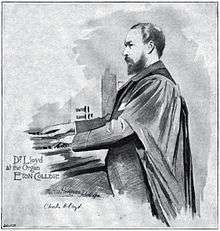Charles Harford Lloyd

Charles Harford Lloyd (Thornbury, 16 October 1849 – Slough, 16 October 1919)[1] was an English composer who became a well-known organist in his time.
His most successful area was organ and choral works but he wrote three clarinet pieces for his friend Randle Fynes Holme (1864-1957), (a talented amateur musician), a number of chamber works, a Festival Overture for orchestra, an organ concerto with orchestra and a number of songs for voice and piano.
He served as organist and choir-master at Gloucester Cathedral, Christ Church Cathedral in Oxford, Eton College Chapel and organist at the Chapel Royal. His most frequently performed works today are his settings of the Anglican Church liturgy.
He had a lifelong friendship with Hubert Parry.[2]
Early years
Charles Harford Lloyd was born on the 16th October 1849 to a Gloucestershire solicitor, Edmund Lloyd. Charlie, as his intimates called him, began to play the piano at an early age, receiving his first instruction from a governess. When he was ten years old, he played the organ at the neighbouring church of Rangeworthy, where his brother-in-law was the vicar as well as another nearby village of Falfield. He attended the grammar school of his native town for his general education.[3]
In 1862, aged thirteen, he took lessons in piano and harmony with John Barrett, of Bristol, who introduced him to the works of Beethoven and Bach. "He simply revelled in Bach's Forty-eight Preludes and Fugues", said Barrett. He also started composing at an early age, composing a mazurka he called "The Pearl of Denmark", in honour of the Princess of Wales Alexandra of Denmark, and settings of two poems of Tennyson, when he was fourteen.[3]
From 1865 to 1868, he was a pupil at Rossall School in Lancashire. Here he took organ lessons with Charles Handel Tovey, music-master of the school, who introduced him to the more contemporary works of Édouard Batiste and Lefébure-Wély. At Rossall, he played the organ in the school chapel and composed Carmen Rossalliense which became the school song.[3]
Magdalen Hall

A friend of his boyhood was Lady Jenkinson, who had been a pupil of Sigismond Thalberg.[4] Lloyd met Frederick Ouseley and Thomas Gambier Parry at her house. The latter invited him to visit Highnam Court, where Lloyd first met his "attached friend of after years", Hubert Parry. They both stayed up till the small hours making music in the drawing room.[3]
In 1868, Lloyd obtained an open scholarship at Magdalen Hall (later renamed Hertford College), where he matriculated 17 October 1868.[3] While studying there, Lloyd was founder, with Hubert Parry, and first president of the Oxford University musical club.[5] He took his B.A. degree in 1872, taking a second class in Classical Mods and Theology, however music was quietly taking possession of his life. He was greatly influenced by the organist of Magdalen College, John Stainer, who gave him lessons in harmony but, more importantly, inspired him musically – "I gained an experience of untold value to me in watching him as he played".[3]
Oxford
Lloyd took his B.Mus at Oxford in 1871. His examiners were Ouseley, Charles William Corfe (1814 - 1883) and Stainer. To make some money, he played the harmonium at Pembroke College Chapel and conducted the Glee Club there. He frequently played duets with Prince Leopold, Duke of Albany and he and Parry played at private gatherings at Cowley House, the residence of Sir Benjamin Brodie. While at Oxford, he was the conductor of a society of undergraduates who called themselves the "Harmonomaniacs". In April 1872, as mentioned above, Lloyd and Parry established the more serious Oxford University Musical Club. The club, known in Oxford as the O.U.M.C., became an important public institution. One of his close friends at Oxford was Sir Walter Parratt.[3]
Tutor
After Oxford, Lloyd had no idea what he wanted to do with his life, so he became a private tutor to the children of socialites. These included the children of the Vernon Harcourts, Lord Inverclyde (then John Burns), of Cunard fame, at Castle Wemyss. At Skelmorlie on the Clyde, he sometimes played the organ in the Presbyterian Church. He saw a great deal of Millais and his wife in Scotland and, through an introduction from them, he visited the Countess Gigliucci (Clara Novello) in Italy. The countess was very impressed with his music-making and was instrumental in Henry Littleton, the proprietor of the music-publishing company Novello & Co, founded by her father Vincent Novello, taking him on as a client. Lloyd said, "But for their helping hand I doubt if any of my compositions would have seen the light. As it is, I have seldom if ever shown them anything which they have refused to publish."[3]
Organist positions

In 1875, The Dean and Chapter of Gloucester Cathedral had approached Lloyd about taking on the classical mastership of the Cathedral Choir School. As it happened, the organist at Gloucester, Samuel Sebastian Wesley, died the following year and the position was immediately offered to Lloyd. This caused dissatisfaction in some musical circles because Lloyd was an unknown at the time, but he soon earned a reputation as an outstanding musician and their fears were put to rest.[3]
The Gloucester organist position carried with it the important office of the Three Choirs Festival, which was held in Gloucester every three years (at that time). Lloyd's first festival was in 1877, for which he selected Brahms' Requiem. A review in The Musical Times stated, "...the intelligence he evinced in the endeavour to realise every point indicated by the composer merit the warmest eulogium."
In 1880, the next time the festival was held, he conducted Beethoven's Mass in D and Hubert Parry's Prometheus Unbound. Prosper Sainton was leader of the orchestra for the festival and wrote Lloyd a letter from France praising both his conducting and Parry's work. Parry was delighted because the critics had not been kind to it. Two of Lloyd's organ pupils, while he was at Gloucester, became well-known organists themselves – they were A. Herbert Brewer, who succeeded him at Gloucester and George Robertson Sinclair who became organist at Hereford Cathedral.[3] Lloyd was organist of Gloucester Cathedral 1876-1881. He was succeeded by Charles Lee Williams.[6]
While at Gloucester Cathedral, Lloyd became the Honorary Secretary of an organisation called Cathedral Organists of England and Wales, which worked for better working and living conditions for organists and choristers.[7][Note 1]
At the invitation of Dean Henry Liddell, Lloyd became organist at Christ Church Cathedral, Oxford (1882-1891). While in Oxford he took his degree of Doctor of Music in 1890. He was appointed to a specially created lectureship in music at Christ Church and at various times he conducted the Oxford Choral Society, the Oxford Philharmonic Society and the Oxford Orchestral Association; but the most important concerts he directed were a series of Public Classical Concerts organised by the University Musical Club on the initiative of William Henry Hadow which continued for six seasons (1891-1897).[3]
In 1886, Lloyd submitted a cantata, Andromeda to the Three Choirs Festival. It received a favourable but reserved review in The Musical Times.[8][Note 2]
From 1887 to 1892, Lloyd was an instructor in organ and composition at the Royal College of Music.[9]
Lloyd was invited to fill the position of music teacher at Eton College from 1892, when Sir Joseph Barnby resigned. As Instructor of Music, his work was largely that of supervision with six music teachers under him. He played the organ in the Eton College Chapel every morning and afternoon, as well as on Sundays, and rehearsed the choir. He also gave frequent organ recitals on Sunday evenings.[3] One of his pupils at Eton was Frederick Septimus Kelly, whose musical inclinations were greatly inspired by him.[10]
 |
Christ was Delivered for Our Offences
Anthem for choir with organ accompaniment |
| Problems playing this file? See media help. | |

After retirement from Eton, Lloyd was appointed organist at the Chapel Royal, St. James Palace from 1914, a post he held until his death. He was succeeded by Stanley Roper.[11]
Who's Who of 1906 described Lloyd's recreations as "figure skating, cycling, boating, golf".[12] Lloyd died "very suddenly" on his birthday on 16 October 1919.[13][1] He was seventy years old that day. The funeral took place at Eton on 21 October 1919. In addition to other works, the Eton College Chapel Choir sang Lloyd's anthem Christ was Delivered for Our Offences.[1]
In 1920, a brass plaque commemorating Lloyd was placed in the Eton College Chapel. It is inscribed in Latin thus:
In dulcem memoriam Caroli Harford Lloyd A.M. D. Mus. qui apud Ecclesiam Cathedralem Gloucestrensem anno MDCCCLXXVI organista factus ibi sex annos exegit dein apud Ecclesiam Cathedralem Christi Oxoniae eodem officio functus annos X Collegii Etonensis Praecentor usque ad annum MCMXIV. Eminebat, denique anno Mcmxvii CapeHarum Regiarum musicae docendae praefectus est.
Natus die XVImo. Oct. MDCCCXLIX.
Obiit eodem die anno MCMXIX.[14][Note 3]
Works
Vocal
Cantatas, anthems, &c.
 |
The Righteous Live Forevermore
Sing Ye to the Lord
|
| Problems playing these files? See media help. | |
- Give the Lord the Honour
- Art Thou Weary (1895) Novello
- Blessed Be Thou, O Lord God (1904)
- Blessed is He (Gloucester Festival, 1883)[15]
- Hero and Leander (Worcester Festival, 1884)[15]
- The Song of Balder (Hereford Festival, 1885)[15]
- Andromeda (Gloucester Festival, 1886)[15]
- Alcestis (Oxford, 1887) For flute, clarinet, two harps and male chorus. OCLC 22883732
- The Longbeard's Saga (Cheltanham Festival, 1887) for male voices
- The Rosy Dawn (Cheltanham Festival, 1887) a pastoral for mixed voices, words by Canon Bell[16]
- The Gleaners' Harvest (1888) for female voices, libretto by Jetty Vogel[17]
- Fear Not, O Land (1890)
- In This Was Manifested (1890)
- A Song of Judgment (Hereford Festival, 1891) a sacred cantata, libretto by J. Powell Metcalfe from Ezekiel and Habakkuk OCLC 12171436
- Rossall (1894) To an Ode by Owen Seaman, for the 50th anniversary of Rossall School (1844-1894). Novello, Ewer and Co., London & New York
- Ballad of Sir Ogie and the Ladie Elsie (Hereford Festival, 1894) setting of a Danish poem
- An Ode on the Birth of Our Saviour (1895)
- A Hymn of Thanksgiving for the Queen's Long Reign (Hereford Festival, 1897)
- The Souls of the Righteous (Gloucester Festival, 1901)
- Sing Ye to the Lord (1903) An Easter anthem, Novello & Co.
- Praised Be the Lord Daily (1904)
- The Righteous Live Forevermore (1904)
- Christ Was Delivered for Our Offences (1905) Novello
- Let Us Come Boldly (1908) Novello
- Novello's Parish Choir Book (1918)
- "A Thirteenth Century Prayer"
- "Lie Still Beloved, Lie Still"
- "Lord, We Uplift Our Voice"
- "Resignation"
- "Uprouse Ye, Christian People", hymn for St. George's Day
Services, &c.
- Morning and Evening Service in E flat
- Magnificat and Nunc dimittis in D, in F, another setting in F (for soprano and baritone soli, chorus, and orchestra), and G
- Versicles, Responses and Litany for men's voices.
Songs
- Various (including two in eight parts, sung at the Leeds and Worcester Festivals), songs, including:
 |
Men Are Fools That Wish to Die
In Summer Weather
|
| Problems playing these files? See media help. | |
- "When at Corinna's Eyes", 5 part madrigal
- "The Garden of the Heart"
- "Magdalen at St. Michael's Gate"
- "Men Are Fools That Wish to Die"
- "Annette" (with clarinet obbligato)
- "To Morning" (1889) words by William Blake
- "A Sunny Shaft Did I Behold" (1890)
- "Twelve by the Clock" (1890) for female voices, Novello
- "In Summer Weather" (1891) words by Harold Boulton, Leadenhall Press
- "Allen-a-Dale" (1895)
- "Come, Tuneful Friends" (1895)
- "Pack Clouds Away" (1895)
- "Dear in Death" (1904)
- "Song of the Dunes" (1904)
- "Hawke"
- "The Vigil"
- "A Song of Exmoor"
- "Shall I Look to Ease My Grief"
- "A Wet Sheet and a Flowing Sea", a four-part song OCLC 16931775
- "He Left the Upland Lawns" (1908) Novello
- "Amor ist ein launisch Kind" (1909) Novello
Instrumental
Orchestral
- Concerto in F minor, for organ and orchestra (Gloucester, 1895)
- Festival Overture (Gloucester, 1898).
Chamber music
 |
Prelude
Allemande
Minuet
Sarabande
Gigue
Suite in the Old Style for Clarinet and Pianoforte |
| Problems playing these files? See media help. | |
- Suite in the Old Style for clarinet (or viola) and piano (1914) Boosey & Hawkes
- - Prelude
- - Allemande
- - Minuet
- - Sarabande
- - Gigue
- Bon voyage for clarinet (1988) edited by Henry Lazarus
- Duo Concertante for violin (or viola, or clarinet) and piano (1888)
- Sonata for pianoforte and violin (played at Oxford by Mr. James Taylor and Dr. Joachim)
- Trio for pianoforte, clarinet, and bassoon
 |
Allegro Agitato
Study in Canon
Elegy
Passacaglia from A Song of Judgment
Arranged for organ by A. Herbert Brewer |
| Problems playing these files? See media help. | |
- Four Characteristic Pieces for Violin and Pianoforte (1912) Novello and Co., London
- - In modo d'una Sonata
- - Cavatina
- - Mazurka
- - Moto Perpetuo
- Idyll for Violin and Pianoforte (1912) Stainer & Bell, London
Organ
- Concerto in F minor (Gloucester Festival, 1895)
- Allegro Agitato (1896) J. B. Millet Company
- Study in Canon (1896) J. B. Millet Company
- Elegy (1897) Novello, Ewer & Co.
- Sonata in D minor
- Allegretto in E
- Andante m A
- Minuet in A
- The Village Organist, a collection of short pieces
- Theme, Variations and Finale (1920) edited by A. Herbert Brewer, Augener Ltd, London
Publications
- "THE ROYAL COLLEGE OF MUSIC; What Results may be anticipated from the new Royal College of Music; (a) as regards its Influence on the British Public as a Musical Public; (&) as regards the Re-establishment of a National School of Composition?" (1883) Transactions of the National Association for the Promotion of Social Science, Longman's, Green & Co., London
Recordings
- "A Thousand Years, by Sea and Land" (to the "Ode to Queen Victoria" of Henry Newbolt)
- — on Spiritus Chamber Choir (2009) Choral Songs in Honour of Her Majesty Queen Victoria, Track 3, Toccata Classics TOOC 0012
- "Bon Voyage!" on The Victorian Clarinet Tradition, Colin Bradbury, clarinet, and Oliver Davies, piano, Clarinet Classics CC0022
Notes
- ↑ The resolutions passed in February 1880 stated:
1.— It is desirable that no cathedral choir should consist of less than 20 boys and 12 men (4 altos, 4 tenors, 4 basses); and that means should be placed at the disposal of the organist for preparing boys to fill up the vacancies occurring from time to time.
2. That the chorister boys should be boarded, lodged, and educated free of expense, in a school specially set apart for the purpose; and that facilities should be afforded for giving them a classical education.
3.—That in consideration of the increase in the number of cathedral services, and the high standard of musical efficiency required by the public, it is desirable that the stipend of every cathedral organist should be raised to an amount which would enable him to devote more personal attention to the cathedral work and render him less bound to give lessons as a means of livelihood. It is considered that a cathedral organist should not receive less than £400 per annum, and that a suitable house near the cathedral should be provided for him rent free, or that he should receive an equivalent.
4.—That the salary of lay clerks or singing men should not be less than £20 per annum.
5.—That in the event of an organist or singing man becoming incapacitated for work, the dean and chapter should have the means to provide a suitable pension for such persons. Also, that after a certain term of service, the organist and singing men should become entitled to a fair pension. - ↑ "Andromeda," produced on September 7, was generally, recognised as a scholarly and musicianly work, although the composer was accused by some of his critics of undue modesty and lack of dramatic force. Mr. Weatherly, the librettist, has made some slight alterations in the old myth. Andromeda, in the course of a chain of choruses, which contain some of the best music of the cantata, is rowed out to sea and is left chained to the rock, at the mercy of the sea monster. Sea maidens and tritons arise from the ocean and apostrophise the victim. The love-motive eventually announces the rescuer, Perseus. A love duet is sung, and Perseus retires behind a rock to fight the monster, the sea maidens praying for victory and joining in the song of love's triumph when the enemy is slain and the lovers are united.
- ↑ "To the dear memory of Charles Harford Lloyd, M.A., Mus.D. Appointed organist of Gloucester Cathedral in 1876 he held that post for six years. Afterwards organist of Christ Church Cathedral, Oxford, for ten years (1882-92). He held with distinction the post of Precentor (and Musical Instructor) at Eton College from 1892 to 1914. Finally appointed Organist (and Composer) to H.M. Chapels Royal; 1917." Born October 16, 1849. Died October 16, 1919.
References
- 1 2 3 Obituary, The Musical Times, Volume 60, p. 621, (1919) New York and London
- ↑ Jeremy Dibble (1998) C. Hubert H. Parry: His Life and Music, Clarendon Press, London ISBN 978-0-19816-702-0
- 1 2 3 4 5 6 7 8 9 10 11 12 "Charles Harford Lloyd" (June 1, 1899) The Musical Times, Vol. 40, No. 676, New York and London
- ↑ "The Thalberg Scholarship" (16 Aug 1873) The Musical Standard, Vol. 5, No. 472, p. 101, Reeves & Turner, London
- ↑ Jeremy Dibble (1992) C. Hubert H. Parry: His Life and Music, p. 50, Clarendon Press, University of Michigan ISBN 978-0-19315-330-1
- ↑ Frank Leslie's Sunday Magazine, Volume 19, p. 507
- ↑ Parliamentary Papers, House of Commons and Command, Vol. 21
- ↑ Routledge's Almanack for 1888 (1888) George Routledge and Sons, London and New York
- ↑ César Saerchinger (1918) "LLOYD, Charles Harford", International Who's Who in Music and Musical Gazetteer, Current Literature Publishing Company, New York
- ↑ Thérèse Radic, editor (2004) Race Against Time: The Diaries of F.S. Kelly, National Library of Australia ISBN 978-0-64210-740-4
- ↑ The Musical Times, Vol. 60, p. 692 (Dec 1, 1919)
- ↑ "LLOYD, Charles Harford", Who's Who (1906) Adam & Charles Black, London; MacMillan, New York
- ↑ The Durham University Journal, Vol. 22 (1920)
- ↑ The Musical Times Vol. 61, p. 762 (Nov 1, 1920)
- 1 2 3 4 Pippa Drummond (2011) The Provincial Music Festival in England, 1784-1914, Ashgate Publishing, Ltd., ISBN 978-1-40943-281-4
- ↑ The Rosy Dawn (1887) Novello OCLC 8159268
- ↑ Catalogue of the Allen A. Brown Collection of Music in the Public library of the City of Boston, Volume 2 (1912)
External links
- Free scores by Charles Harford Lloyd at the International Music Score Library Project
- Free scores by Charles Harford Lloyd in the Choral Public Domain Library (ChoralWiki)